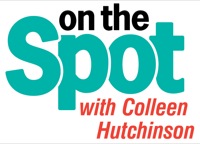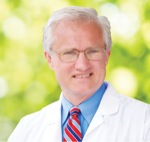
This month’s On the Spot is the annual exit interview with outgoing American Society for Metabolic and Bariatric Surgery President Eric J. DeMaria, MD. Dr. DeMaria is a professor and the chief of general and bariatric surgery at Brody School of Medicine at East Carolina University, in Greenville, N.C.
In this column, we cover various aspects of the obesity epidemic, the doctors who are a part of its treatment, the association that supports surgical treatment, and the partners working with the ASMBS to form critical synergies that enable shared efforts toward reducing and eliminating this health epidemic.

A big thank-you to Dr. DeMaria for taking the time to share his insights on the association’s recent accomplishments and challenges, the state of MBSAQIP, the endorsement of the single anastomosis duodeno-ileal bypass with sleeve gastrectomy procedure, and being granted the Focused Practice Designation by the American Board of Medical Specialties.
—Colleen Hutchinson
Colleen Hutchinson is a medical communications consultant at CMH Media, based in Philadelphia. She can be reached at colleen@cmhadvisors.com.
Colleen Hutchinson: Can you tell us about the Focused Practice Designation (FPD) by the American Board of Medical Specialties for metabolic and bariatric surgery?

Dr. DeMaria: The most far-reaching accomplishment of the past year, albeit many years in the making, is the announcement that our surgical specialty was granted the FPD by the American Board of Medical Specialties. The new concept of the FPD was developed to reflect an evolution of practice that occurs following initial certification, and is relevant to continuing certification. As such, the FPD recognizes physicians who devote a substantial portion of their practice to a specific area and is awarded to physicians in practice rather than only to new fellowship graduates, characteristic of specialty certification. Perhaps the most rewarding aspect of this designation is that it required strong and unprecedented support for metabolic and bariatric surgery by our peers in the American Board of Medical Specialties. Throughout the 36-year history of our organization, our members have struggled with a lack of recognition and acceptance for what we do. The approval of an FPD for metabolic and bariatric surgery is a strong statement indicating both legitimacy and acceptance of our specialty, at long last!
CH: With the five-year anniversary of the Metabolic and Bariatric Surgery Accreditation and Quality Improvement Program (MBSAQIP) approaching, is anything new happening on this front?
Dr. DeMaria: This year, the dedicated members of the American College of Surgeons Metabolic and Bariatric Surgery Committee, under the capable leadership of committee chair John Morton, MD, updated the standards and published an updated version of Optimal Resources for Metabolic and Bariatric Surgery. The new standards include the addition of an obesity medicine director role for medical bariatricians for centers that qualify. To make bariatric surgery even safer, MBSAQIP has launched its third nationwide metabolic and bariatric surgery quality improvement collaborative. This new initiative is called Bariatric Surgery Targeting Opioid Prescriptions (BSTOP). Opioid use is now an epidemic in the United States, and all accredited centers are being urged to enroll in BSTOP so they can begin work to save as many lives from opioid dependence among their patients as possible.
CH: What initiatives does the ASMBS have to increase awareness and inform the public about metabolic and bariatric surgery? With that, can you tell us about the new ASMBS direct-to-consumer information campaign for weight loss surgery?
Dr. DeMaria: We are entering into a partnership with the highly trusted consumer health information entity WebMD for the purpose of disseminating information to the public about surgical treatment for obesity and its many comorbid conditions, including an initiative to raise awareness about surgery to treat type 2 diabetes. WebMD is arguably the most trusted digital information resource for patients in the United States today, and many thousands of people seek health-related information from this website each day. The ASMBS is also a trusted resource for patients, and we will place content on the WebMD site to educate potential patients about their treatment options and furthermore present surgical options with evidence to back up their value. Given the high degree of safety and efficacy we have today in the United States for surgical treatment options, it is critical that we message the public to change their outdated preconceptions about surgical procedures. The best news of all is that, in light of the high-level evidence and widely adopted guidelines we now have supporting surgical treatment, we can simply present the evidence and allow patients to draw their own conclusions!
CH: On a related note, the ASMBS has a new patient-facing website that provides the public with information regarding surgery for diabetes (escapediabetes.org). Can you tell us about that?
Dr. DeMaria: We are excited about the launch of our new patient-facing website on surgery for diabetes: www.escapediabetes.org. The concept of “escaping diabetes” is carefully considered terminology, as we felt that many patients feel trapped due to type 2 diabetes and likely have not been informed that diabetes surgery may offer them disease remission and a decrease in long-term diabetes complications. One key aspect of this new website is the Cleveland Clinic’s new patient-friendly Individualized Diabetes Complications Risk Scores, which will allow a patient to estimate his or her risk for serious diabetes-related complications over 10 years and how diabetes surgery would affect those risks. We plan to promote this website widely and direct interested patients to our membership to receive accurate evidence-based education about their treatment options, including surgery.
CH: Is the ASMBS working with national medical societies to help other nonsurgical physicians understand the indications and benefits of bariatric and metabolic surgery?
Dr. DeMaria: Absolutely! We have made this a priority over recent years, including hosting the successful Annual Collaborative Care Summit on Obesity, led by Dr. John Morton. We held our sixth successful summit this year with a record 33 organizations in attendance. This year we introduced a new twist regarding the summit by organizing a Primary Care Forum for which we had five primary care organizations and obesity treatment specialty organizations sit down for a half-day discussion of the challenges primary care providers face in trying to treat obesity and its related diseases. We agreed to work together to co-author a white paper reviewing these challenges and recommending solutions, and I am pleased to report we have already circulated a preliminary draft for input from the participants of the forum. Overall it was a very rewarding discussion that did a lot to develop goodwill between our society and the participating primary care organizations; they seemed to really appreciate that we were willing to listen to them describe their challenges and assist them in seeking solutions to those challenges. Our mantra from the weekend overall: We are better together!
CH: What should general surgeons understand about the endorsement of the single anastomosis duodeno-ileal bypass with sleeve gastrectomy (SADI-S) by the ASMBS?
Dr. DeMaria: SADI-S is fundamentally a modification of the duodenal switch operation in which the sleeve gastrectomy is combined with a loop duodeno-ileostomy instead of a Roux-en-Y configuration. As a form of duodenal switch, the SADI-S is characterized by decreased absorption of nutrients as part of its mechanism for weight loss. Given this mechanism, lifelong vitamin and other nutritional supplements are required, and patients are vulnerable to nutritional deficiencies if they do not comply with those recommendations. For general surgeons, it will be important to recognize patients who have had a previous SADI-S procedure and differentiate them from patients who have had more commonly performed procedures like gastric bypass. It is also important to note that SADI-S patients may present with malnutrition that requires parenteral nutrition, as enteral feeding may not be sufficient to overcome the malabsorptive state. It is anticipated that most issues relative to SADI-S may require consultation with a metabolic and bariatric surgeon.
CH: I understand there is going to be a relaunch of the ASMBS annual meeting next year in Atlanta. How will this aid in improving treatment of obesity and better assist current general and bariatric surgeons and other physicians who are involved in the treatment of obesity?
Dr. DeMaria: Although we have had overall successful meetings as a member of ObesityWeek, many of our members and industry partners have struggled with attending our meetings. Early November is a time of the year when most surgeons are busy clinically and cannot leave their practices or easily find surgical coverage. Participation in our meeting has also been affected by family holidays, like Halloween, and the need for many of our members to attend the ACS Clinical Congress. Our surgeons have struggled with the large size of the meeting, which makes it difficult to find and network with colleagues.
More significantly, as part of ObesityWeek, we were bound by a governance model that created financial issues and operational difficulties that affected our status as an independent organization. In order to alleviate these and other concerns of the ASMBS, and after detailed analysis, including legal review and attempts to reconcile the issues, our executive council unanimously chose the only course of action within our purview under the ObesityWeek operating agreement by voting to leave the ObesityWeek LLC, effective in 2020. By withdrawing from the larger meeting, the ASMBS will eventually be able to schedule our meetings at a time that will align better with our membership’s needs. I feel gratified that we have heard positive comments from so many members, and from industry partners, regarding the decision to relaunch the ASMBS annual meeting in Atlanta in 2020. We will continue to have colocated meetings with The Obesity Society for several years into the future due to contractual commitment; however, the ASMBS will once again have autonomy over its annual meeting.
CH: What is your advice to incoming President Matthew Hutter, MD?
Dr. DeMaria: Matt is a very accomplished and dedicated surgeon with many great ideas and strategies to lead our organization going forward. As such, I would say he really doesn’t need my advice. However, I would say that I am particularly pleased that he has played an important role in planning our multiyear strategy for increasing awareness of surgical treatment for obesity and diabetes, as I feel this has also become one of his important priorities and will therefore be sustained, hopefully long enough to make an impact on increasing the number of patients who will realize an opportunity to undergo lifesaving surgical treatment for this disease.
CH: What are you most proud of in this remarkable last year for the ASMBS as the association’s president?
Dr. DeMaria: I am most proud of the body of work accomplished by our organization and its many dedicated hardworking members. Our society is so successful, thanks to the tireless work of our members on behalf of our patients and our specialty.
As far as our leadership initiatives, I am most proud that we pursued a strategic planning process and determined a primary goal for the organization going forward, that is, to increase the utilization of surgical treatment for obesity. This is not based on self-serving promotion, but rather on the well-established basis that surgery, despite being the most effective treatment for the disease of obesity, is used only 1% of the time for patients who should be considered as candidates. This low utilization cannot be allowed to continue, with so many millions suffering from the disease of obesity and its complications! The methods to be employed in accomplishing this primary objective were identified as working to raise the public’s awareness, increasing collaborations with our medical colleagues, and further engaging the ASMBS membership.
Most importantly, we had buy-in from the next two presidents of the ASMBS, Dr. Hutter and Shanu Kothari, MD, meaning for the first time that the ASMBS can reliably pursue objectives that require multiple years to accomplish, rather than smaller objectives that can be realized in just one president’s year. But most of all, we didn’t just identify objectives; we developed, endorsed and funded plans to accomplish our primary objective. Hence, we have new initiatives including the exciting partnership with WebMD, the escapediabetes.org website, the successful Forum on Primary Care for Obesity Treatment, and so forth.
Finally, I am grateful for the confidence in me that the ASMBS membership demonstrated by electing me to be their president, and I hope they feel that we have delivered for them and for our patients during my tenure. Personally, I can’t wait to get back to work and urge all of us to rededicate ourselves to the incredibly important work that we have ahead. The future of our specialty is bright, and I believe that, with all of us working together, we can finally reach a “tipping point” in which we see dramatic and appropriate increases in the utilization of surgery to treat the epidemic of obesity, type 2 diabetes and its many other associated diseases.
